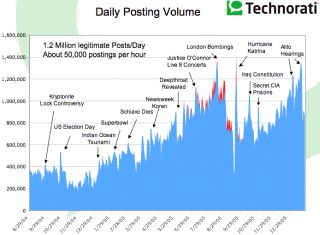Citizen Cane: How bloggers have become social watchdogs

Journalists are some of the most cynical people around. They're skeptical as hell, and it'll take you double the time to convince them that you're not trying to pull a fast one.
Fortunately, or not, I'm no exception. But, truth be told, I was recently almost conned into thinking I had missed out on a chance to win a $4,000-massage chair.
Long story short: I got a call on my mobile a couple of days back from a lady who said her company had sent me a letter in March (to which I replied I never received--duh), informing me that I had won a massage chair worth $4,000. But since I hadn't claimed within the last six months, the prize money had to be donated to charity--a legal requirement in Singapore, or so she said. Luckily for me, the caller chirped, her company's auditor requires it to return to me the same value in prize money, in the form of travel and various other vouchers.
Sounds like a con? I thought so, too, until the caller correctly recited my name, identity card number (unique to each Singaporean) and home address--obviously, she had my mobile number as well. These details were personal and because she knew them, I was encouraged to believe her company was legit.
Fortunately, as the conversation wore on, I got increasingly suspicious--especially when I found out I would have to attend a marketing event to claim my vouchers and pay "nominal sums" in administrative fees. I started asking more probing questions and the caller eventually, and abruptly, hung up on me.
Peeved that I was almost conned (I really wanted that massage chair), I called the operator to gather more information about the company, and discovered it was registered under the name Jue Shi Marketing.
The name wasn't familiar, and I wasn't sure how or who I should contact to determine if the company had a known record for attempting such scams.
I was also furious about how my personal details had been leaked and abused by an unscrupulous company, and I was convinced I wasn't the first person it had attempted to rip off.
Thanks to the vast online blogging community, I found the data I was looking for.
It was only by scouring the Internet and scanning through numerous blog entries and online forums, that I was able to link the company to two other names Great Concepts and Oriental Travel. From there, I identified local news reports which revealed that the Consumers Association of Singapore had received over 160 complaints against the company last year.
There were also several accounts from others who had fallen prey to Oriental Travel et al, and who gave detailed descriptions of the different tactics and tricks the company's 'call center operators' would use on their targets.
One blogger highlighted that Oriental Travel was--and still is, by the way--listed as a retail partner on the Web site of an established bank. Put two and two together, and consumers who are customers of the same bank would wonder if Oriental Travel had obtained their personal information from the financial services provider, even if the latter had nothing to do with the scam. I sent an e-mail to the bank and to its credit, was almost immediately contacted by a customer service representative who assured me the bank would be investigating the matter. I've yet to hear back from her, but perhaps the bank would do a better job of screening its retail partners if it monitored the relevant blogging communities.
Needless to say, the information provided by the various bloggers was invaluable.
In countries like Singapore where there are no clear privacy laws, the most effective way consumers can best protect themselves is to ensure they remain well-informed users. In this aspect, blogs and online forums have an increasingly important role to play.

According to U.S. blog trackers at Technorati, the number of blogs is more than 60 times bigger than what it was just three years ago. The blogosphere (a collective term for all blogs and blog communities) grows two-fold every 22 weeks, and a new blog is created every second each day. Almost 14 million bloggers continue to post new entries three months after they first created their blogs.
Often dubbed citizen journalists, bloggers--some of them, at least--share a common agenda to share their experience, exchange information and warn fellow consumers about companies with dodgy practices.
More importantly, in a realm where unbiased reporting can sometimes be scarce, bloggers have become social watchdogs.
Blogs are not only a useful platform to broadcast information that wasn't able to make its way to the mainstream media, they also enable messages to be sent out instantaneously to the public.
While the credibility of some blogs remain questionable, and corporate blogs are mostly gated, the blogosphere is certainly one of the most important entities to have emerged from the still-evolving Web phenomenon--even if it is to help one blogger attain his dream house for the price of a paper clip.